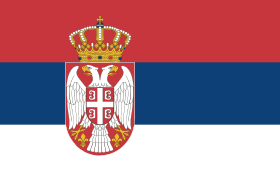Difference between revisions of "Serbia"
Von Stryor (talk | contribs) (Created page with "{{InfoBar 2.0 |image=Flag of Serbia.svg |Full name=Republic of Serbia |Alternative name=Република Србија<br>Republika Srbija<br>Republic of Serbia |type=country...") |
(→History) |
||
| Line 27: | Line 27: | ||
==History== | ==History== | ||
| + | There are villages appearing 6000 years ago. | ||
| + | |||
| + | In 6-7 A.D., Serbs domiciled in that area. | ||
| + | |||
| + | In the middle period of 10 A.D., the Kingdom of Serbia was founded. | ||
| + | |||
| + | At the end of 15 A.D., the Ottoman Empire conquered this land and started the control that lasted for 5 centuries. | ||
| + | |||
| + | With the help of the Russian Empire, Serbia gained its independence in 1878, and created its kingdom in 1882. | ||
| + | |||
| + | In June 28, 1914, a nationalist in Serbia, Gavrilo Princip, shot and killed Archduke Franz Ferdinand Carl Ludwig Joseph Maria of Austria and his wife Sophie with a gun in Sarajevo, broke the Sarajevo Incident. This incident and the fuse after it, July Crisis, caused [[the First World War]] broke out. | ||
| + | |||
| + | In 1918, after the end of the First World War and the defeat of the Central Powers, Serbia and other Yugoslav nations jointly established the Kingdom of Yugoslavia. | ||
| + | |||
| + | During World War II, it was occupied and partitioned by Germany, most of Vojvodina was annexed by Hungary, Kosovo was incorporated into Albania, and the rest was occupied by Germany, at which time Tito led the Yugoslav Partisans in a four-year-long guerrilla war against the Germans, and after the end of World War II, Tito became the supreme leader of Yugoslavia and ruled for more than 30 years. | ||
| + | |||
| + | After Tito's death, Milošević persisted in Greater Serbia, led to ethnic conflict intensifies. Finally, [[Slovenia]], [[Croatia]] and other 2 republics gained independence, the country broke up. The remaining Serbia and Montenegro set up the Federal Republic of Yugoslavia, and then [[Yugoslav Wars]] broke out. | ||
| + | |||
| + | In 2003, it was renamed Serbia and Montenegro. In 2006, Montenegro gained independence. Serbia re-emerged as an independent country. | ||
| + | |||
| + | On February 17, 2008, Kosovo declared its own independence, but Serbia did not recognize its independence. | ||
| + | |||
| + | Serbia is now an autonomous and independent country. | ||
| + | |||
==ACGN works related to Serbia== | ==ACGN works related to Serbia== | ||
==Fictional character based on Serbia== | ==Fictional character based on Serbia== | ||
Revision as of 06:03, 30 March 2022
| Serbia | ||
 | ||
| Full name | Republic of Serbia | |
| Alternative name | Република Србија Republika Srbija Republic of Serbia | |
| type | country | |
| Superior Division | Europe | |
| Subdivisions | 30 states | |
| Administrative Center | Belgrade | |
| Administrative Center Type | Capital | |
| Location | Southern Europe | |
| leader | Alexander Vucic | |
| Leader Type | President | |
| language | Serbian | |
| Ethnicity | Serbian (mainly) Albanian etc. | |
| Faith | Orthodox (mainly) Roman Catholicism, Islam, etc. | |
| Armed Forces | Armed Forces of Serbia | |
| Forming | mid 10th century [1] | |
| Territory | 88,400 km2 [2] | |
| Population | 6,960,000[3][4] | |
| Currency | Serbian Dinar | |
| calendar | Gregorian | |
| Debut works | See #ACGN works related to Serbia | |
Serbia(Serbian:Србија/Srbija,English:Serbia,Japanese: セルビア/Serubia),full name Republic of Serbia(Serbian:Република Србија/Republika Srbija),is a country located in southern Europe,Land borders with Montenegro, Bosnia and Herzegovina, Croatia, Hungary, Romania, Bulgaria, North Macedonia, Kosovo region[5].
Contents
History
There are villages appearing 6000 years ago.
In 6-7 A.D., Serbs domiciled in that area.
In the middle period of 10 A.D., the Kingdom of Serbia was founded.
At the end of 15 A.D., the Ottoman Empire conquered this land and started the control that lasted for 5 centuries.
With the help of the Russian Empire, Serbia gained its independence in 1878, and created its kingdom in 1882.
In June 28, 1914, a nationalist in Serbia, Gavrilo Princip, shot and killed Archduke Franz Ferdinand Carl Ludwig Joseph Maria of Austria and his wife Sophie with a gun in Sarajevo, broke the Sarajevo Incident. This incident and the fuse after it, July Crisis, caused the First World War broke out.
In 1918, after the end of the First World War and the defeat of the Central Powers, Serbia and other Yugoslav nations jointly established the Kingdom of Yugoslavia.
During World War II, it was occupied and partitioned by Germany, most of Vojvodina was annexed by Hungary, Kosovo was incorporated into Albania, and the rest was occupied by Germany, at which time Tito led the Yugoslav Partisans in a four-year-long guerrilla war against the Germans, and after the end of World War II, Tito became the supreme leader of Yugoslavia and ruled for more than 30 years.
After Tito's death, Milošević persisted in Greater Serbia, led to ethnic conflict intensifies. Finally, Slovenia, Croatia and other 2 republics gained independence, the country broke up. The remaining Serbia and Montenegro set up the Federal Republic of Yugoslavia, and then Yugoslav Wars broke out.
In 2003, it was renamed Serbia and Montenegro. In 2006, Montenegro gained independence. Serbia re-emerged as an independent country.
On February 17, 2008, Kosovo declared its own independence, but Serbia did not recognize its independence.
Serbia is now an autonomous and independent country.